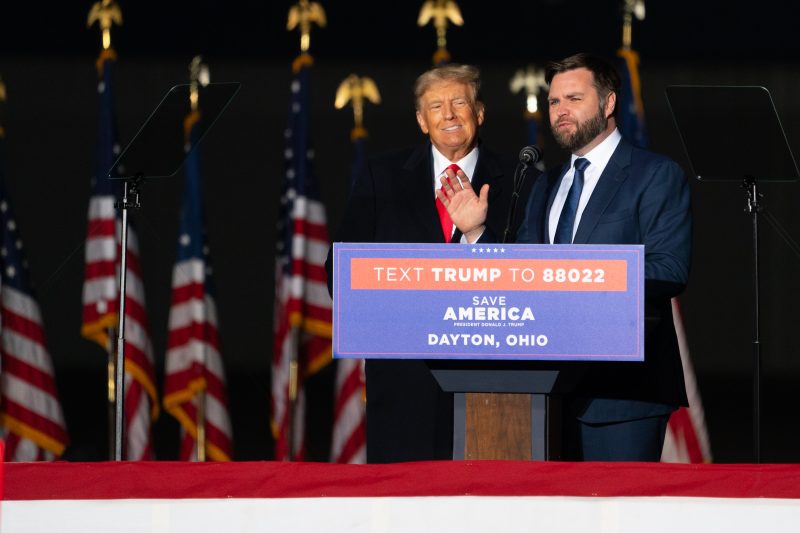
J.D. Vance’s sloppy effort to turn MAGA world against Ukraine funding

Sen. J.D. Vance (R-Ohio) has long been skeptical of America’s support for Ukraine in its effort to repel Russian invaders. During his first days in office a year ago, he led a group of mostly right-wing legislators in calling for more details on all spending related to the conflict, with the obvious intent of using it as leverage against any increase. In December, he suggested that Ukraine would at some point have to agree to cede land to Russia to end the war.
It is not surprising, then, that Vance opposes efforts underway in the Senate to approve a $95 billion bill that includes additional money for Ukraine. What is surprising is the misleading (and probably dishonest) argument Vance is making against the legislation — one focused on riling up Donald Trump’s most fervent supporters.
At issue is a provision of the proposed funding bill that would allocate billions of dollars to the federal government’s Ukraine Security Assistance Initiative (USAI).
“These funds expire on September 30, 2025 — nearly a year into the possible second term of President Trump,” Vance explained in a memo that he says he sent to every Republican in Congress on Monday. Then the warning: “These are the exact same accounts President Trump was impeached for pausing in December 2019.”
That’s the argument Vance is making: Democrats are trying to pass a bill that will allow them to impeach Trump again! Republicans must stand in their way!
It is a nonsensical argument, rooted in an obvious misrepresentation of Trump’s 2019 impeachment.
First of all, we should note that Sept. 30, 2025, is not “nearly a year into” a presidential term that begins in Jan. 20, 2025. Nor is it a random date selected to create an imposition on Trump.
Sept. 30, 2025, is the end of the 2025 federal fiscal year. That year begins Oct. 1, 2024. The stipulation in the legislation is simply that the indicated amounts are available for use until the end of the fiscal year. Rather than sitting on it as a means of impeaching Trump, it seems far more likely that there would be a scramble to figure out if a large chunk of that funding could be disbursed before he took office.
Vance’s memo asserts that Trump’s 2019 impeachment was centrally about his disinclination to release funds that had been similarly allocated to USAI.
“If President Trump where to withdraw from or pause financial support for the war in Ukraine in order to bring the conflict to a peaceful conclusion, ‘over the objections of career experts,’ ” he says in his memo, “it would amount to the same fake violation of budget law from the first impeachment, under markedly similar facts and circumstances.”
But of course, the 2019 impeachment wasn’t centrally about Trump’s withholding funds from Ukraine, but why he did so.
It wasn’t centrally about the pause on that support any more than it was centrally about the “perfect” phone call Trump made to Ukrainian President Volodymyr Zelensky. It was about a pattern of applying pressure on Ukraine — withholding a state visit, making weapons available for purchase — that aimed at having Zelensky announce an investigation into Joe Biden and his son Hunter, who served on the board of a Ukrainian energy company. It was about how Trump used the power of his office in service of his reelection campaign, given that he (correctly) saw Biden as his likely opponent.
(If there are any doubts that Republicans, including Trump, thought that tying Joe Biden to his son’s business efforts, the past year of right-wing agitation on the subject should serve to resolve them.)
The impeachment wasn’t focused on whether Trump violated the Impoundment Control Act by not releasing the funds appropriated for Ukraine, as Vance argues. That law is rooted in maintaining the separation of powers in the federal government; if Congress approves spending, the president can’t simply ignore that approval. But while Trump withheld funding from Ukraine without making it public, he ultimately released the allocated funds.
Instead, it was that the pause was part of this broader effort.
“I think it’s crazy to withhold security assistance for help with a political campaign,” one administration official said in a text message to another. Two days later, the aid was released.
Vance describes all of this as the “false argument put forward by Democrats,” as though the real concern wasn’t Trump’s efforts to leverage his position but, instead, that Ukraine had to wait longer than anticipated to receive its funding.
But that’s an argument that is more useful in the moment. If Vance can whip Trump supporters into a fury over the idea that this is a backhanded way of trying to impeach Trump again, he can pressure his Republican peers. The debate moves from one centered not on the merits of the funding — should we aid Ukraine against Russia? — to an imaginary slight to Trump.
It might work. At least one of Vance’s more credulous allies has already taken the bait.
